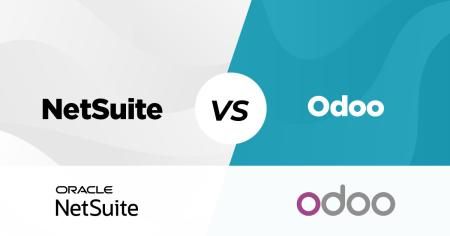What is NetSuite?
NetSuite is a cloud-based ERP from Oracle designed for growing mid-market and enterprise organizations. It offers a full suite of applications covering finance, CRM, eCommerce, inventory, supply chain, and more , all in one unified system.
Best For: Mid-sized to large businesses seeking scalability, global operations, and advanced reporting.
What is Odoo?
Odoo is an open-source ERP platform that provides a collection of business apps (finance, CRM, sales, inventory, etc.). It’s known for being modular , companies can add applications as they need them.
Best For: Small to mid-sized businesses looking for affordability, flexibility, and open-source customization.
Request More Info About NetSuite vs Odoo
| Feature / Capability | NetSuite | Odoo |
| Business Size | Mid-market to enterprise | Small to mid-sized |
| Deployment | Cloud-based (SaaS) | Cloud or on-premise |
| Customization | Built-in SuiteCloud platform, scalable integrations | Highly customizable, open-source flexibility |
| Industry Focus | Broad: manufacturing, services, retail, wholesale, software, etc. | Strong with small businesses and niche industries |
| Scalability | Excellent for rapid growth and global operations | Can be limited for complex, multinational operations |
| Integrations | Native integrations + third-party ecosystem | Open API + community-built apps |
| Pricing | Subscription-based, tailored to company size and users | Freemium + paid enterprise version, modular app pricing |
Pros and Cons of NetSuite
Pros
- Unified ERP suite across all business functions
- Excellent scalability for growing and global businesses
- Advanced financial reporting and compliance features
- Large partner ecosystem for implementation and support
Cons
- Higher cost compared to entry-level ERPs
- May be more than needed for very small businesses
Pros and Cons of Odoo
Pros
- Lower entry cost, including free community version
- Flexible, modular approach to ERP adoption
- Highly customizable via open-source model
- Option for on-premise or cloud hosting
Cons
- Can require significant IT resources for customization and maintenance
- Limited scalability for larger, multinational operations
- Support and updates depend on version (community vs enterprise)
- Integration quality varies across community apps
Key Differences: NetSuite vs Odoo
- Scalability: NetSuite is built for growth and global operations; Odoo is better suited for smaller companies.
- Customization: Odoo offers open-source flexibility, while NetSuite provides structured customization through SuiteCloud.
- Pricing: Odoo’s low-cost entry point appeals to startups, while NetSuite’s pricing reflects enterprise-grade capabilities.
- Support: NetSuite comes with Oracle-backed support and a certified partner network; Odoo support varies depending on version and vendor.
Which ERP is Right for You?
If your business is small, tech-savvy, and looking for a budget-friendly ERP with flexibility, Odoo might be a good fit. But for mid-sized and enterprise-level organizations, especially those planning for growth, global expansion, or advanced financial requirements, NetSuite is the stronger long-term solution.
At GURUS Solutions, we’ve spent nearly two decades helping businesses implement, customize, and scale NetSuite. Whether you’re transitioning from Odoo or evaluating your ERP options, our team can guide you to the right solution and ensure a successful implementation.
Contact us today to Learn More
